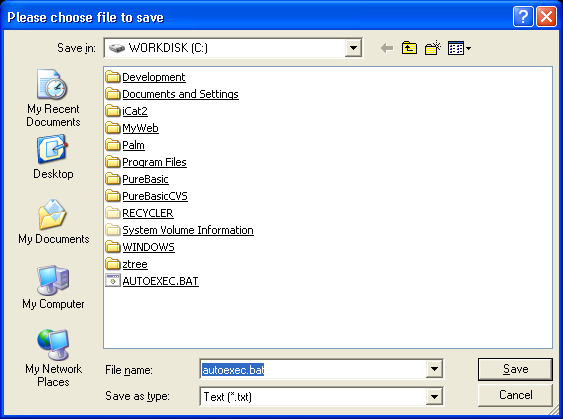The Pattern is a standard filter which allow to display only the files which end with such or such extension. It must be in the following form : "Text file | *.txt | Music file | *.mus;*.mod" The pattern always work by pair: name (which really appears in the filter) and extention (ie: *.txt). Several extensions can be specified for a single type by using the ; (semi-colon) separator.
Finally 'PatternPosition' specifies which pattern must be the default. It begin from 0 up to the number of pattern. Once the requester has been closed, SelectedFilePattern() can be used to get back the selected pattern.
The returned 'FileName$' can be easily split into file, path and extension string with the following functions: GetFilePart(), GetPathPart() and GetExtensionPart().
Example:
StandardFile$ = "C:\autoexec.bat" ; set initial file+path to display
; With next string we will set the search patterns ("|" as separator) for file displaying:
; 1st: "Text (*.txt)" as name, ".txt" and ".bat" as allowed extension
; 2nd: "PureBasic (*.pb)" as name, ".pb" as allowed extension
; 3rd: "All files (*.*) as name, "*.*" as allowed extension, valid for all files
Pattern$ = "Text (*.txt)|*.txt;*.bat|PureBasic (*.pb)|*.pb|All files (*.*)|*.*"
Pattern = 0 ; use the first of the three possible patterns as standard
File$ = SaveFileRequester("Please choose file to save", StandardFile$, Pattern$, Pattern)
If File$
MessageRequester("Information", "You have selected following file:"+Chr(10)+File$, 0)
Else
MessageRequester("Information", "The requester was canceled.", 0)
EndIf
